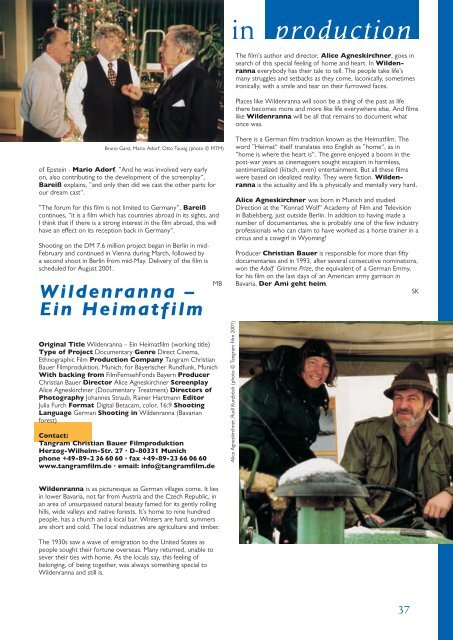Titel Kino 2/2001(2 Alternativ) - German Films
Titel Kino 2/2001(2 Alternativ) - German Films
Titel Kino 2/2001(2 Alternativ) - German Films
You also want an ePaper? Increase the reach of your titles
YUMPU automatically turns print PDFs into web optimized ePapers that Google loves.
of Epstein – Mario Adorf. ”And he was involved very early<br />
Bruno Ganz, Mario Adorf, Otto Tausig (photo © MTM)<br />
of Epstein - Mario Adorf. ”And he was involved very early<br />
on, also contributing to the development of the screenplay“,<br />
Bareiß explains, ”and only then did we cast the other parts for<br />
our dream cast“.<br />
”The forum for this film is not limited to <strong>German</strong>y”, Bareiß<br />
continues, “it is a film which has countries abroad in its sights, and<br />
I think that if there is a strong interest in the film abroad, this will<br />
have an effect on its reception back in <strong>German</strong>y“.<br />
Shooting on the DM 7.6 million project began in Berlin in mid-<br />
February and continued in Vienna during March, followed by<br />
a second shoot in Berlin from mid-May. Delivery of the film is<br />
scheduled for August <strong>2001</strong>.<br />
Wildenranna –<br />
Ein Heimatfilm<br />
Original Title Wildenranna – Ein Heimatfilm (working title)<br />
Type of Project Documentary Genre Direct Cinema,<br />
Ethnographic Film Production Company Tangram Christian<br />
Bauer Filmproduktion, Munich, for Bayerischer Rundfunk, Munich<br />
With backing from FilmFernsehFonds Bayern Producer<br />
Christian Bauer Director Alice Agneskirchner Screenplay<br />
Alice Agneskirchner (Documentary Treatment) Directors of<br />
Photography Johannes Straub, Rainer Hartmann Editor<br />
Julia Furch Format Digital Betacam, color, 16:9 Shooting<br />
Language <strong>German</strong> Shooting in Wildenranna (Bavarian<br />
forest)<br />
Contact:<br />
Tangram Christian Bauer Filmproduktion<br />
Herzog-Wilhelm-Str. 27 · D-80331 Munich<br />
phone +49-89-2 36 60 60 · fax +49-89-23 66 06 60<br />
www.tangramfilm.de · email: info@tangramfilm.de<br />
Wildenranna is as picturesque as <strong>German</strong> villages come. It lies<br />
in lower Bavaria, not far from Austria and the Czech Republic, in<br />
an area of unsurpassed natural beauty famed for its gently rolling<br />
hills, wide valleys and native forests. It’s home to nine hundred<br />
people, has a church and a local bar. Winters are hard, summers<br />
are short and cold. The local industries are agriculture and timber.<br />
The 1930s saw a wave of emigration to the United States as<br />
people sought their fortune overseas. Many returned, unable to<br />
sever their ties with home. As the locals say, this feeling of<br />
belonging, of being together, was always something special to<br />
Wildenranna and still is.<br />
MB<br />
Alice Agneskirchner, Rudl Kurzböck (photo © Tangram Film <strong>2001</strong>) in<br />
production<br />
The film’s author and director, Alice Agneskirchner, goes in<br />
search of this special feeling of home and heart. In Wildenranna<br />
everybody has their tale to tell. The people take life’s<br />
many struggles and setbacks as they come, laconically, sometimes<br />
ironically, with a smile and tear on their furrowed faces.<br />
Places like Wildenranna will soon be a thing of the past as life<br />
there becomes more and more like life everywhere else. And films<br />
like Wildenranna will be all that remains to document what<br />
once was.<br />
There is a <strong>German</strong> film tradition known as the Heimatfilm. The<br />
word ”Heimat“ itself translates into English as ”home“, as in<br />
”home is where the heart is“. The genre enjoyed a boom in the<br />
post-war years as cinemagoers sought escapism in harmless,<br />
sentimentalized (kitsch, even) entertainment. But all these films<br />
were based on idealized reality. They were fiction. Wildenranna<br />
is the actuality and life is physically and mentally very hard.<br />
Alice Agneskirchner was born in Munich and studied<br />
Direction at the ”Konrad Wolf“ Academy of Film and Television<br />
in Babelsberg, just outside Berlin. In addition to having made a<br />
number of documentaries, she is probably one of the few industry<br />
professionals who can claim to have worked as a horse trainer in a<br />
circus and a cowgirl in Wyoming!<br />
Producer Christian Bauer is responsible for more than fifty<br />
documentaries and in 1993, after several consecutive nominations,<br />
won the Adolf Grimme Prize, the equivalent of a <strong>German</strong> Emmy,<br />
for his film on the last days of an American army garrison in<br />
Bavaria, Der Ami geht heim.<br />
SK<br />
37

















